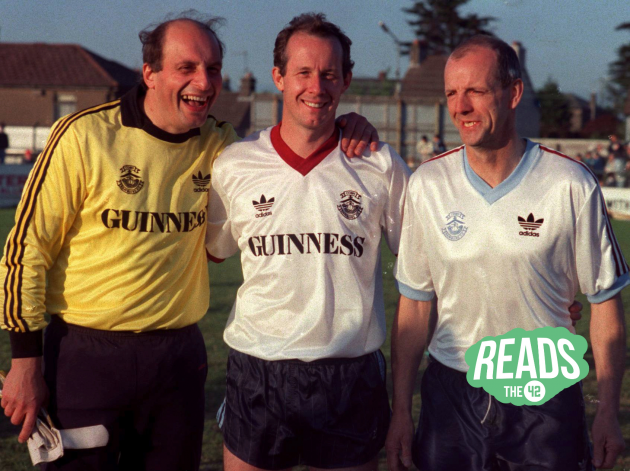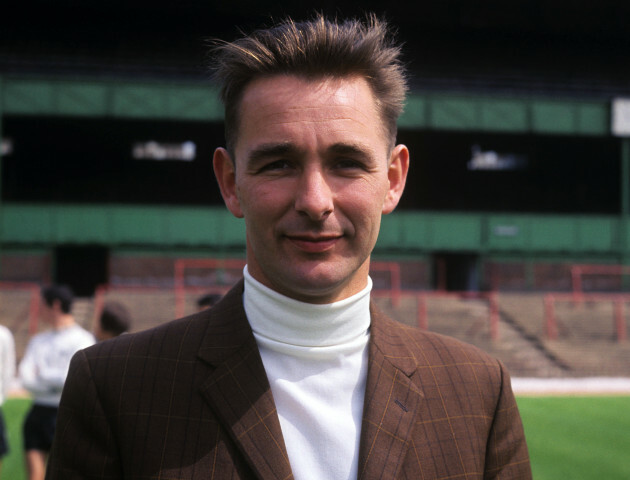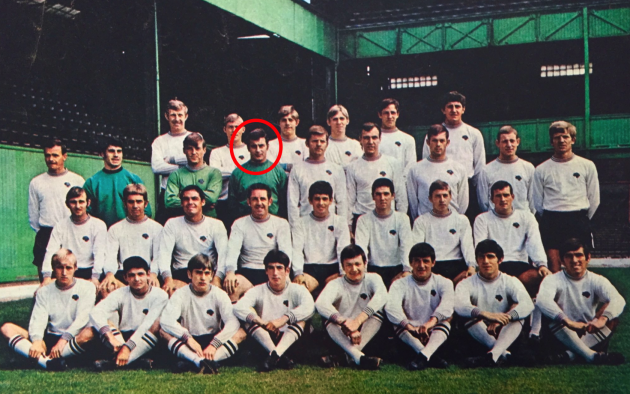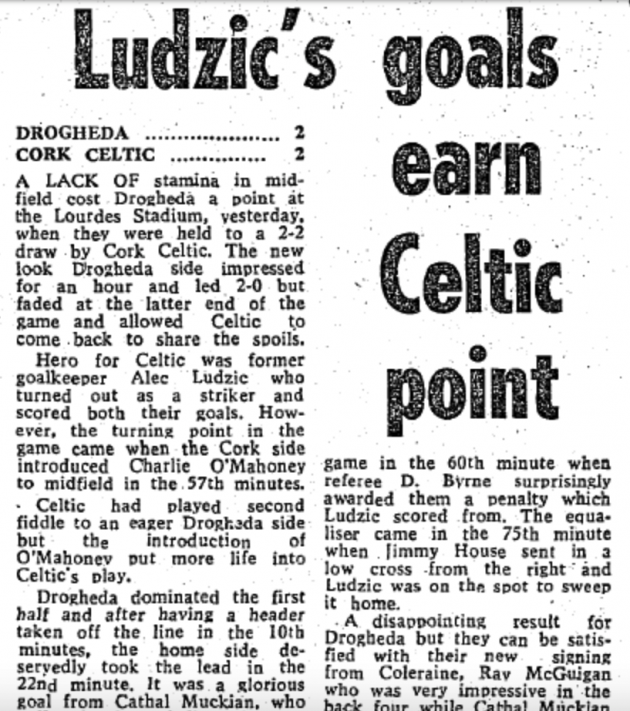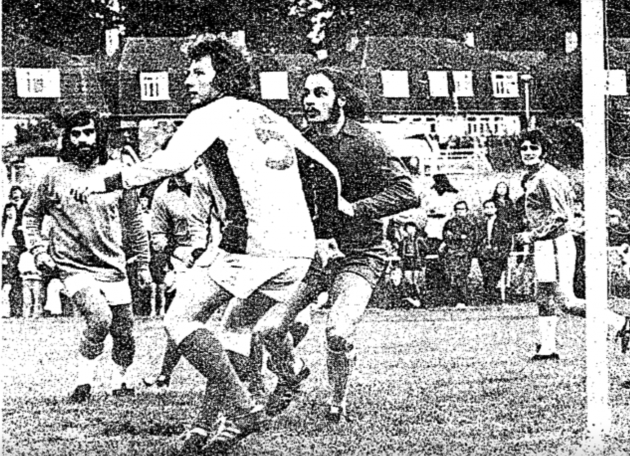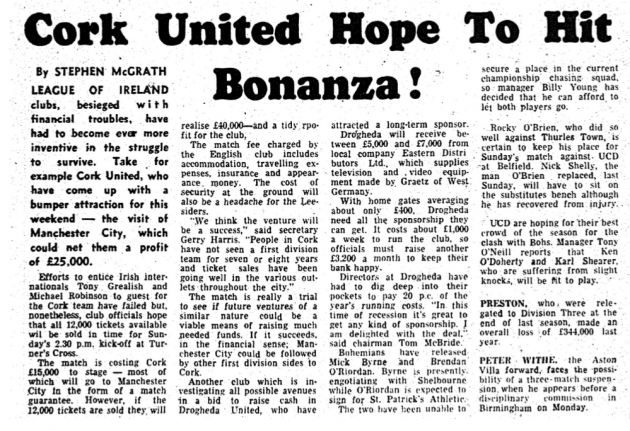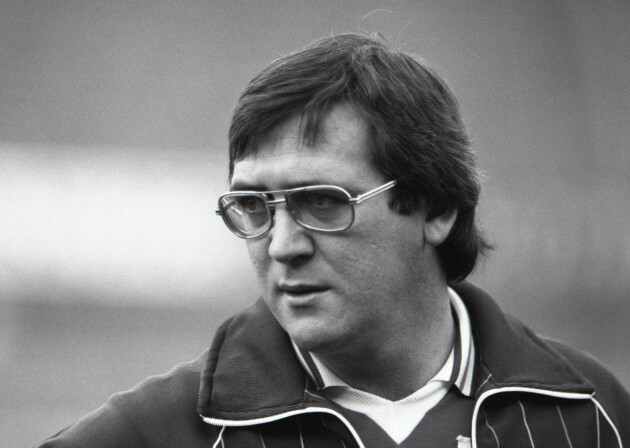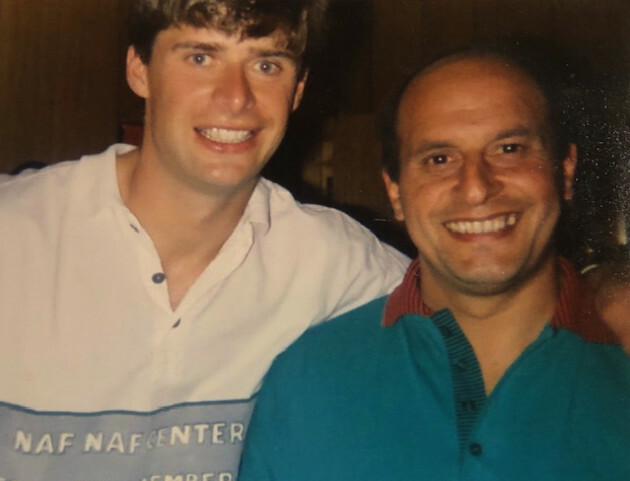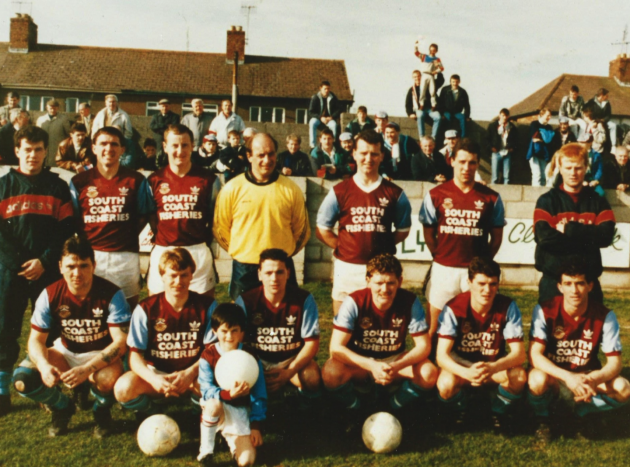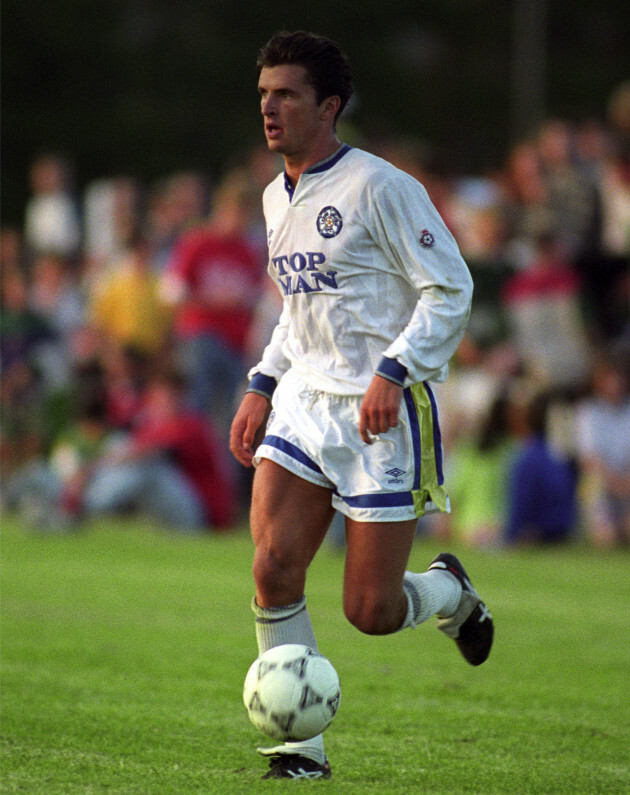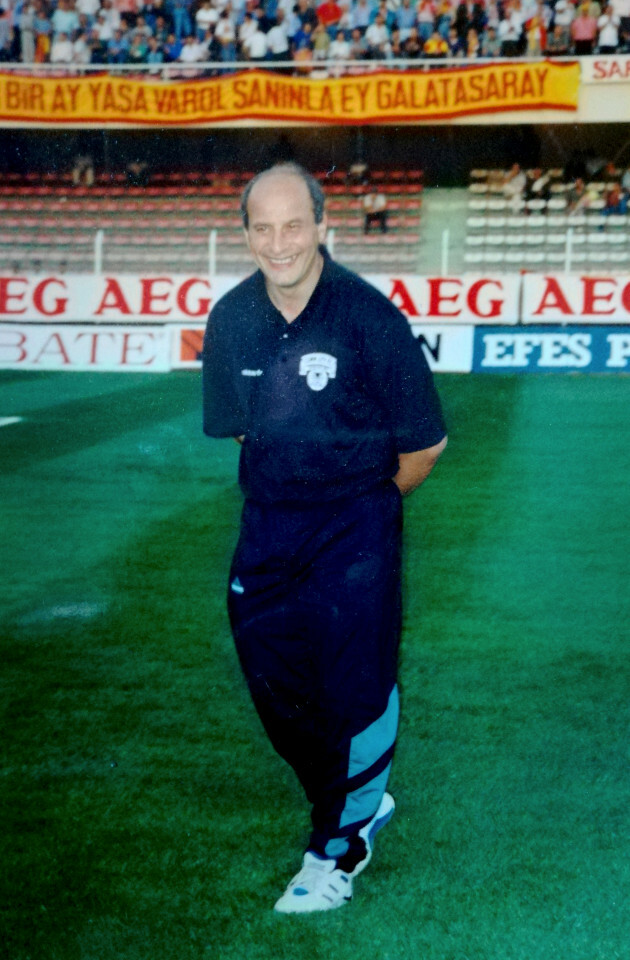IN 1967, WHEN CORK Hibernians manager Amby Fogarty felt his squad needed strengthening, he asked a favour of Derby County boss Brian Clough.
Eager to assist his former Sunderland team-mate, Clough invited two members of his youth team to cut their teeth in the League of Ireland. Dave Wigginton followed Fogarty back to Cork, but Alek Ludzik – for the time being at least – opted to stay.
When Fogarty returned on another recruitment mission in 1969, Ludzik decided that the time had finally come for him to experience competitive senior football.
A few days later, the 19-year-old goalkeeper checked in to the Metropole Hotel on MacCurtain Street and picked up a copy of the Evening Echo from the bar. He was taken aback by a key detail of his transfer that was reported by the local newspaper.
By the time of his second visit to Derby, Fogarty had moved from Hibs to their arch rivals, Cork Celtic – a fact Ludzik had overlooked when agreeing to come to Leeside.
Instead of making his League of Ireland debut for one of the leading title contenders in the local derby that was scheduled to take place only 48 hours later, the newcomer was set to play against them for a Celtic side who were languishing at the bottom of the table.
He was beaten by Wigginton, his ex-Derby pal, for the game’s only goal, but the majority of the post-match press coverage was devoted to the young fella from England with the unusual surname.
- For more great storytelling and analysis from our award-winning journalists, join the club at The42 Membership today. Click here to find out more >
“Fantastic is the only word to describe his performance,” Fogarty said of Ludzik, who had saved a Carl Davenport penalty during Cork Celtic’s 1-0 loss at Flower Lodge.
“On my way out of the ground, one of our supporters – who has been watching Cork soccer for 40 years – told me Ludzik is the best goalkeeper he had ever seen play.”
The game marked the beginning of a loan spell that was due to last a month. Yet more than a quarter of a century later, Ludzik’s remarkable League of Ireland career was still ongoing.
* * * * *
BORN IN DERBY to parents of Polish and Italian extraction, Aleksander Ludzik was raised within a hundred yards of the Baseball Ground, where County played their home games for over a hundred years until the club’s relocation to Pride Park in 1997.
His father, who served in the Polish Army, had been among the many forced to flee their homeland following Nazi Germany’s invasion of 1939. Wladyslaw Ludzik made it to Italy, where he met his wife-to-be, Olimpia Zevi. The couple then sought to build a new life in the English midlands.
An aspiring goalkeeper, Alek was signed by Derby County as a young teenager. Shortly after his appointment as the club’s manager, Brian Clough – who went on to guide the Rams to their first English top-flight title – upgraded him to a professional contract when he impressed at the age of 17 in a pre-season friendly against Stockport County.
Ludzik accumulated a considerable amount of youth and reserve team experience, but with two other goalkeepers (Les Green and Colin Boulton) ahead of him in the first-team pecking order, a temporary move to Ireland – in tandem with his close friend Barry Notley, who was also snapped up by Amby Fogarty – made sense with his development in mind.
His debut against Cork Hibernians may have ended in defeat, but Ludzik was soon helping Cork Celtic gather the points they desperately needed to climb the League of Ireland ladder.
A report in the Irish Press on his second game for the club noted that “the cross-channel goalkeeper gave another polished display” as Celtic beat St Patrick’s Athletic 2-1 to pick up their first win of the season at the 10th attempt.
A week later, Declan Downs told Irish Independent readers that Cork Celtic were “very fortunate to have acquired the services of such a talented performer” after watching Ludzik in a 2-2 draw with Drumcondra.
As his performances attracted more media attention, further variations of his name began to appear in print. Journalists were advised that he was neither Alec nor Alex, Ludzic nor Ludzig, but the misspellings continued and he was simply too polite to keep correcting them.
“Our goalkeeper has added a lot to our confidence,” said Fogarty. “I spent two years chasing him and I think he has shown that he is the best goalkeeper in the country.”
A charismatic youngster who drew praise for his acrobatic style of goalkeeping, there was a fiery side to Ludzik too. It made its first appearance during an FAI Cup defeat to Bohemians in February 1970.
Taking exception to a challenge from Tony O’Connell, Ludzik responded by aiming a kick at the Ireland international. Referee Edward Roche deemed the indiscretion to be worthy of a red card, with the FAI’s Emergency Committee fining him the princely sum of £2.
At that juncture, the initial loan agreement that brought him to Cork had expired. Yet in a rare example of someone affiliated to Cork Hibernians lending a hand to their local adversaries, Ludzik’s desire to return home to Derby had begun to dwindle after he was introduced to Ann O’Connell – who eventually became Ann Ludzik.
Ann, a dedicated Hibs supporter who was among the 12,000 spectators in attendance for Alek’s debut, ensured that Cork Celtic retained a player who became crucial to an ascent that culminated with their crowning as League of Ireland champions in 1974.
“He was only supposed to stay for a month, but then a month became two months. Then he met my mam,” explains David Ludzik, the eldest of the couple’s three sons. “As a big Cork Hibs fan, she wasn’t too happy about having to begrudgingly shout for Celtic.”
His transfer from Derby County made permanent, Ludzik ended his first season as a Cork Celtic player with selection for the League of Ireland XI. However, he was unable to take part in a fixture against Bill Shankly’s Liverpool at Dalymount Park in July 1970 after injuring his hip in a friendly for his club against Blackpool.
While helping to improve the fortunes of Cork Celtic, Ludzik became an immensely popular figure within the League of Ireland community. The revered Irish Press sportswriter Con Houlihan would later refer to him as “one of my favourite people”. He was “one of the most colourful characters” in Irish football, according to the Evening Herald’s David Faiers.
Although known predominantly for his ability to prevent goals, Ludzik wasn’t bad at scoring them either. He was occasionally deployed as a striker, a role he filled for several consecutive games during the early stages of the triumphant 1973-74 season.
After netting both goals as Cork Celtic came from behind to earn a 2-2 draw at Drogheda United, he fired in the winner three days later in a League Cup tie against Home Farm.
Whether he was picked to play in goal or outfield, Ludzik was noted as a reliable penalty taker too, as evidenced by his contribution to both of that season’s fixtures against Sligo Rovers.
Having converted in a 3-1 away victory, his goal in a 1-1 draw at Turner’s Cross earned Celtic a point that kept them on track to claim the club’s first – and only – League of Ireland title.
The signings of players like Irish international Alfie Hale and ex-Chelsea striker Bobby Tambling were an integral part of the success of a club for whom the top of the table was unfamiliar territory. Nevertheless, as the only player to feature in every game of the campaign, it was Ludzik who was chosen by supporters to be the recipient of their Player of the Year award.
For their participation in the following season’s European Cup, Cork Celtic received a walkover against Omonia Nicosia, who were unable to compete due to the instability in Cyprus caused by a military coup d’état and the subsequent Turkish invasion.
The second round paired Celtic with Soviet champions Ararat Yerevan. After a 2-1 loss at home, the Cork side were comprehensively beaten 5-0 away to the Armenian outfit, who went on to be eliminated at the quarter-final stage by eventual winners Bayern Munich.
The aftermath of Muhammad Ali’s knockout of George Foreman in the ‘Rumble in the Jungle’ dominated that week’s sports pages , but there was still room for Dinny Allen to laud one of his Cork Celtic team-mates: “Alek Ludzik was brilliant. But for him, it could have been 14-0 instead of 5-0.”
As part of their preparations for their season as defending League of Ireland champions, Cork Celtic had travelled to the UK for a series of meetings with non-league opposition.
One of those fixtures was against Dunstable Town, who managed to draft in two of the biggest names in English football. Managed by Barry Fry, the Dunstable team included former England striker Jeff Astle and the Manchester United legend George Best.
Despite the attacking calibre of the opposition, Ludzik kept a clean sheet to earn the visitors a goalless draw. In doing so, he caught the eye of an Arsenal scout who told the Evening Echo’s Billy George after the game that he had been “impressed” by the Cork Celtic goalkeeper and vowed to monitor him in the League of Ireland.
A move to the Gunners didn’t materialise, but a return to the UK was on the agenda for Ludzik the following summer. After informing Cork Celtic of his intention to end his six-year stay in Ireland, he was led to believe that the club were open to accommodating a free release.
Under the management of Peter Taylor – who he knew from his time as Brian Clough’s right-hand man at Derby County – the offer of a two-year contract from Brighton & Hove Albion prompted Ludzik and his wife to pack up their belongings and head for the south coast of England. However, the deal fell through when Celtic demanded a fee that Brighton weren’t willing to pay.
Clough, who had just begun a spell at Nottingham Forest that would deliver two European Cups, invited Ludzik to train with the City Ground outfit while he surveyed his options. He spent a month at the club before deciding on a return to Cork.
Amby Fogarty, as manager of Athlone Town, hoped to coax him to St Mel’s Park, but with the collapse of his transfer to Brighton temporarily depleting Ludzik’s enthusiasm for the game, he settled for a role with Albert Rovers in the Munster Senior League.
Somewhat ironically, it was his commitment to Albert Rovers (who were later renamed Cork Alberts and Cork United) that brought Ludzik back to the League of Ireland. For the 1976-77 season, the club was elected to compete on the national stage following the demise of Cork Hibernians.
After a difficult first year that saw them finish second from bottom in the League of Ireland, their next season at that level was considerably more prosperous. It featured a 3-1 win over Dundalk, during which Ludzik added to his tally of goals in extraordinary circumstances as he scored directly from a wind-assisted kick-out.
Having been recognised with the Soccer Writers Association of Ireland Player of the Month award for January 1978, Ludzik then played a significant role in helping Cork Alberts reach the League Cup final.
“We had many shots on goal but Alek Ludzik brought off some brilliant saves,” Bohemians manager Billy Young lamented after his team’s semi-final defeat. “He was in tremendous form.”
The decider against Dundalk was settled on penalties after both legs had finished 2-2. Ludzik scored with his side’s first attempt in the shootout and then made saves to thwart both Terry Flanagan and Noel King, but that wasn’t sufficient to deny the Louth side victory.
During a game against St Patrick’s Athletic in April 1980, Ludzik saved a Joey Malone penalty which the referee then ordered to be retaken after the goalkeeper was adjudged to have moved too soon. Ludzik was booked for his protests, before saving Malone’s second attempt too.
With Cork United trailing in the closing stages, Ludzik handed the goalkeeper’s jersey to Frankie Lennox and played for the final 13 minutes as a striker. He couldn’t fashion an equalising goal, but as a snapshot of his broad range of talents and unrelenting passion for the game, the 1-0 defeat at Richmond Park epitomised why he had become one of the most fascinating figures in Irish football.
In December 1981, he played for Cork United in a friendly against Manchester City at Turner’s Cross. Martin O’Neill and Åge Hareide – who would face each other as managers of Ireland and Denmark respectively in a 2018 World Cup play-off – were among the goalscorers in a comfortable 4-0 win for the English club.
In their arranging of the fixture, Cork United bosses made projections for what they anticipated to be a lucrative exercise. What transpired was a financial disaster that inflicted irreparable damage to the club.
After only 2,000 spectators paid in, United were unable to settle Manchester City’s fee of £8,000. Amid mounting debts, they were expelled at the end of the season, leaving Cork without League of Ireland representation for the first time since 1924 (Cork Celtic had already met with a similar fate in 1979).
With Ludzik pushing 33 and growing disillusioned with the precarious nature of League of Ireland football, retirement looked increasingly likely when the new season kicked off without him involved.
He was a family man with a wife, two children and another soon to arrive. His commitments to his job as a sales rep with Three Stripe International – a Cork-based company producing licensed Adidas gear – were also demanding of his time.
Then, a few games into the 1982-83 campaign, a call came from Eoin Hand. The Ireland boss, who was double-jobbing as manager of FAI Cup holders Limerick United, was in the process of replacing ex-Irish international Kevin Fitzpatrick following his retirement.
Ludzik’s spare time was scarce, but he didn’t need to be asked twice if he could absorb the three-hour round trip that would allow him to extend his League of Ireland career.
Limerick’s first victory with Ludzik in the team came when they upset the form book to beat Drogheda United 2-1 away from home. After the game, Drogs chairman Michael Byrne remarked: “Their goals came against the run of play, and I have to say that Limerick goalkeeper Alek Ludzik had an outstanding game.”
Although he spent the next five seasons making the same journey to and from Limerick, the plight of football in his adopted hometown was seldom far from his thoughts.
In May 1983, he organised a meeting of Cork players and stakeholders at the Imperial Hotel in an effort to bring League of Ireland football back to the Rebel County. Cork City eventually filled the void for the 1984-85 season, and in spite of the overtures they made to Ludzik at the time, he stayed loyal to Limerick for a few more years.
“Alek may be based in Cork but he is one of the most dedicated players we have,” Joe O’Mahony, Limerick’s newly-appointed manager, said. “If we had 11 players like him we’d be doing very well.”
As his time in Limerick took him into his late 30s, Ludzik’s status as one of the League of Ireland’s top goalkeepers stayed intact. In the aftermath of a 2-2 draw between the sides in the 1985 FAI Cup semi-finals, Galway United’s Dennis Bonner – brother of Ireland goalkeeper Packie – said: “Alek Ludzik saved Limerick. He’s the man they have to thank.”
“If Alek hadn’t been there we’d be out of the cup,” added Joe O’Mahony, whose side eventually succumbed to an extra-time goal from John Mannion in the replay.
With the travel beginning to take its toll, Ludzik rejected the offer of a new Limerick contract in 1987 to link up with Cobh Ramblers. The East Cork outfit were about to embark on their third season since being elected to the League of Ireland.
It ended with promotion to the Premier Division, an achievement that couldn’t have been possible – according to manager Liam McMahon – without the brilliance of their 38-year-old goalkeeper.
“When Alek joined us from Limerick,” said McMahon, “I reckoned that he would be worth five or six extra points to us at the end of the season. He was the man I thought would make 10 or 12 saves that other goalkeepers might not have managed.
“While all the players made a huge contribution to our promotion drive, I feel – and I think I speak for the majority – that Alek Ludzik made the difference for us.”
Ludzik, whose performances earned him a nomination for the First Division Player of the Year award, was in particularly impressive form during the 1-0 win away to Athlone Town that confirmed Ramblers’ promotion.
“Alek Ludzik was the hero of the day, making several saves and this was probably the finest goalkeeping performance seen at St Mel’s Park for several years,” reported the Athlone Examiner.
His next assignment was a game against a Republic of Ireland team who were preparing to face England, Soviet Union and the Netherlands at the European Championship.
Jack Charlton’s side were 5-2 winners in a friendly against a Munster XI at Turner’s Cross, but Ludzik left his mark on the game by saving a John Aldridge penalty.
At a post-match function that was held at the Country Club Hotel, Charlton attempted to tease Ludzik with a playful accusation of damaging the confidence of one of his players ahead of the biggest fixture in the nation’s history.
Aldridge was already licking the wounds that had been inflicted 12 days earlier at Wembley, where he became the first player in history to have an FA Cup final penalty saved as Liverpool suffered a shock defeat to Wimbledon.
“If he can’t score against a part-time goalkeeper who’s almost 40,” Ludzik responded to the Ireland manager, “he doesn’t stand much of a chance of doing it at a European Championship!”
Of his father’s allegiance when Ray Houghton headed Ireland to a famous victory over England in Stuttgart a fortnight later, David Ludzik says: “He was like any Irish fella with England – he didn’t want them to win, even though he was born there.
“He would have seen himself more as Polish than English. Polish and Italian were the languages that were spoken in the house when he grew up, so when he came over here it was Poland first, then Ireland. He would never really have considered himself English at all.”
Cobh Ramblers were unable to outrun the looming threat of relegation in their first season as a top-flight club, but Ludzik did all he could to keep them competitive.
Following a goalless draw in Inchicore, Darren Hughes wrote in the Irish Press that Brian Kerr’s St Patrick’s Athletic “saw their dream of European competition next season slip further from their grasp thanks to a superb performance from Alek Ludzik, who performed like an acrobatic 18-year-old.”
While continuing as Ramblers’ first-choice goalkeeper, Ludzik also agreed to become assistant manager to Alfie Hale ahead of the 1989-90 season. Among his responsibilities for the new campaign, which he shared with team-mate Fergus McDaid, was to pull the car in at Silversprings Hotel en route to St Colman’s Park. A young player who lived nearby usually needed a lift.
The lad he was tasked with ferrying to Cobh made his debut in a pre-season friendly against West Bromwich Albion. By the time he had his first competitive outing against Kilkenny City two weeks later, Ludzik was already adamant that Roy Keane was a player destined for grander stages than Buckley Park.
A few weeks into the new season, Hale stepped down due to work commitments and Ludzik spent a month serving as caretaker manager. One of his first acts was to urge the decision-makers at Cobh Ramblers to sign Keane to a professional contract.
With the Mayfield youngster promoted from amateur status on a deal worth £50 a week, Ramblers were subsequently in a position to command a transfer fee for a player who was soon generating interest from England.
Before departing for a trial at Nottingham Forest that would launch the career of one of the most influential footballers of his generation, Keane starred for Cobh Ramblers as they began their FAI Cup campaign with a 1-0 win over Monaghan United.
The 18-year-old midfielder – who was about to be signed by Ludzik’s former boss, Brian Clough, for £47,000 – had impressed again, yet when Tim Hegarty of Harp Lager made his way onto the pitch holding the man-of-the-match award at full-time, it was the 40-year-old goalkeeper to whom it was presented.
When a testimonial match was arranged for Ludzik at Turner’s Cross at the end of that season, the stature of the participants emphasised the esteem in which he was held.
A week after ending his decorated career by playing for Ireland against Finland at Lansdowne Road, Liam Brady lined out for the Cobh Ramblers XI that took on Cork City. The former Arsenal and Juventus star was substituted in the second half of City’s 4-3 win, making way for GAA legend (and former Cork Celtic player) Jimmy Barry-Murphy.
Other guest players on the night included Brian Carey, who had recently been brought to Manchester United by Alex Ferguson. Denis Irwin had committed to playing too, but was prevented from doing so by his club, Oldham Athletic, who were in negotiations with United that concluded with a £625,000 move for the full-back to Old Trafford.
Another season with Cobh Ramblers carried Ludzik beyond his 41st birthday, before Cork City recruited him in the summer of 1991 to take charge of their reserve team (he would later work as assistant manager under Damien Richardson, Noel O’Mahony and Rob Hindmarch).
While he was also enlisted to provide back-up to the club’s first-choice goalkeeper, Phil Harrington, the move to City was seen as the beginning of the end of his playing career.
Nevertheless, Ludzik continued to keep himself in good nick and took a full part in training. When injuries and suspensions to Harrington required him to step into the breach, he met the same high standards that had been set over the course of a League of Ireland career that now spanned four different decades.
Ludzik made his City debut at Musgrave Park in a friendly against a Leeds United side who were crowned champions of England at Manchester United’s expense nine months later.
Howard Wilkinson’s side eased to a 3-0 victory, “but they would have won far more easily were it not for two remarkable second-half saves” that Ludzik made to deny Gary Speed and Lee Chapman, as Noel Spillane noted in his match report for the Evening Echo.
Although he was confined to the bench for the fixtures against continental heavyweights like Bayern Munich and Galatasaray, Ludzik played an important role in Cork City’s European ties by travelling out in advance to scout the opposition and arrange logistics.
He returned from one trip with a particularly ominous report. A 6-0 aggregate defeat lay in store for City, with manager Damien Richardson admitting afterwards that his team were “torn apart” by a Slavia Prague outfit that was spearheaded by a couple of talented 21-year-olds named Patrik Berger and Vladimir Smicer.
Cork City were FAI Cup runners-up in Ludzik’s first season with the club. He played his part in the journey to Lansdowne Road, stepping in for the injured Phil Harrington in a 2-0 quarter-final win against a Limerick City team led by player-manager Sam Allardyce.
“It was no wonder that Cork boss Noel O’Mahony ran from the dugout at the final whistle to embrace his veteran goalkeeper, Alek Ludzik,” Charlie Stuart reported in the Irish Press. “In the four decades that he has graced the local game, Ludzik was always a goalkeeper of the highest quality. Age has not diminished his ability and it was fitting that he should earn the applause of the 5,000 home fans when he received the man-of-the-match award afterwards.”
The following season, City were League of Ireland champions after emerging victorious from a dramatic three-way play-off with Bohemians and Shelbourne. It was the first time the trophy resided on the banks of the Lee since Cork Celtic’s triumph of 1974. Nineteen years separated the successes, yet the common denominator was Alek Ludzik.
He collected his second winner’s medal in recognition of the seven games he played during the 1992-93 campaign. One of those appearances came in a 1-1 draw against Bohs, when he saved a Pat Fenlon penalty to deny the Dublin side a win that would have seen them dislodge City from the top of the table.
His time at Cork City yielded many memorable experiences, but perhaps the most cherished came in the Munster Senior Cup. For several games in the competition, including a 2-1 loss to Limerick City in the 1995 final, he was joined in the team by his eldest son, who was making his own way through the club’s youth ranks as a striker.
“That’s very nice to be able to look back on now. There was a picture of us in the paper at the time as well,” David Ludzik recalls. “When you’re only 18 you kind of wouldn’t be paying too much attention to something like that. I appreciate it a lot more now, definitely. A father and son in the same team obviously isn’t something that would happen too often.”
Later that year, Alek Ludzik – a few months shy of his 46th birthday – came off the bench to replace the injured Jody Byrne in a 1-1 draw with Shelbourne. It was the final act in a career in Irish football that spanned a remarkable 27 seasons.
* * * * *
EARLIER THIS MONTH, the Ludzik family should have been celebrating Alek’s 72nd birthday. Instead, they’ll mark the 20th anniversary of his sudden passing later this year.
On a Wednesday night in December 2002, David met a group of friends in a Cork city centre bar to watch Manchester United play Deportivo La Coruna in the Champions League.
After arriving home later that evening, he and his father traded their views on United’s 2-0 victory in what turned out to be the last conversation they’d ever have. Alek, despite experiencing no prior health issues, suffered a heart attack during the night.
“It happened completely out of the blue,” David explains. “He was actually coaching in UCC only a few months beforehand. He would have still been out jogging and stuff like that. It was just a massive shock to everyone. He was so healthy, the last person you’d expect something like that to happen to.”
Emanating from former colleagues and opponents alike, there was a deluge of tributes paid by the Irish football community in the days that followed his untimely death.
Alfie Hale, Ludzik’s team-mate at Cork Celtic and manager at Cobh Ramblers, credited him with bringing League of Ireland goalkeeping “to a higher level”, while Cork City’s manager and ex-captain Liam Murphy described him as “a great character and one of the most professional, dedicated people you could work with.”
The man who signed him at Limerick, Eoin Hand, said: “Alek had a real presence – whether it be on the field or off it. He knew how to work the gamesmanship angle but never in an unsporting way. I recall a penalty shootout with Alek between the sticks for Cork. The battle of wits was won hands down by Alek. Our takers hadn’t a chance.”
David Ludzik says: “The funeral was a bit of a blur because obviously you’re still in shock, but I do remember the queue down the road in Ballintemple. It was huge.
“Between fellas he played with and against, not just from Cork but up the country as well, it was a really big turn-out. It was very nice for people to do that and it showed the amount of respect there was for him everywhere.”
The late Alex Ludzic getting a bit of ribbing from @HamiltonRTE dressed as Del Boy, about his OG howler for Limerick City at Milltown in 1985 @SpainGary @maevemcg pic.twitter.com/MN1VwMlozS
— KillianM2 TV Archive 📺 (@KillianM2) September 19, 2021
That his team-mates included the likes of Bobby Tambling and Roy Keane, who were born 30 years apart, underlines Alek Ludzik’s remarkable longevity in the League of Ireland.
A man who only came to play for a month was ultimately woven into the fabric of the game’s history in Cork – and perhaps its future too.
At various levels, children and grandchildren – such as David and his eight-year-old son, Alex, who’s now learning his trade with Carrigaline United – have ensured that the Ludzik name retains a place on Leeside’s footballing landscape.
“There was a clip on Twitter recently of my dad doing an interview with George Hamilton,” David says. “My young fella would never have seen anything of him like that, so to be able to show him that and say ‘this is your grandad’, it was nice – he was thrilled.
“I still have cuttings in a scrapbook at home, even going back as far as when he played against Ray Clemence in a reserve game between Derby and Liverpool. They’re special things to be able to look at.
“It’s hard to believe that it’s been 20 years, but it’s nice to take an opportunity to remember all the good things that happened. We’d all feel very proud of him for that.”
For more great storytelling and analysis from our award-winning journalists, join the club at The42 Membership today. Click here to find out more >
